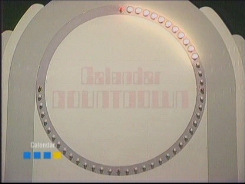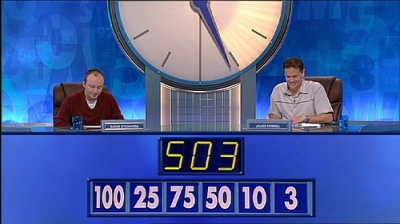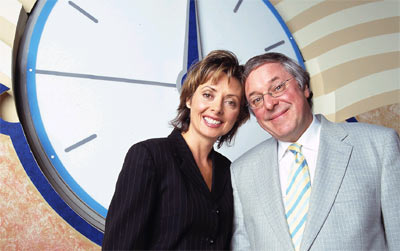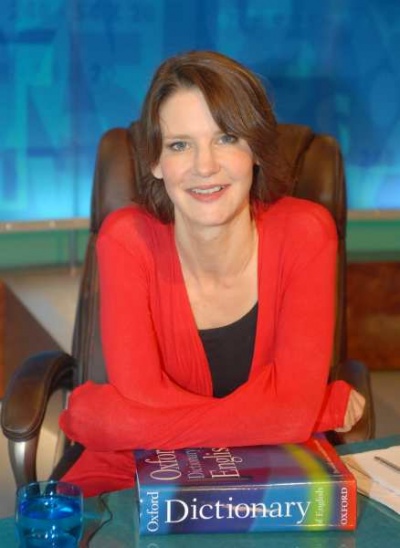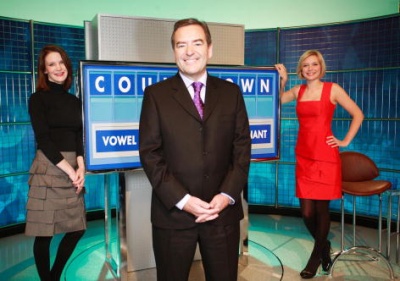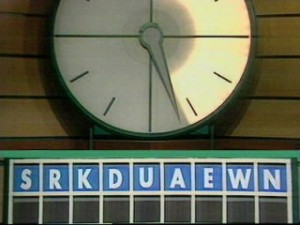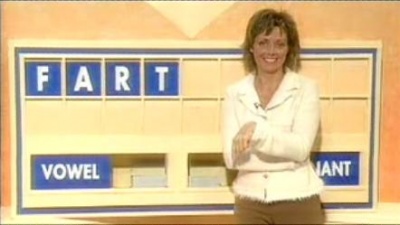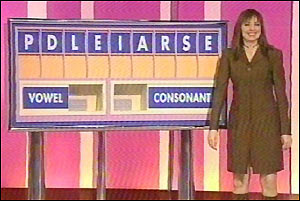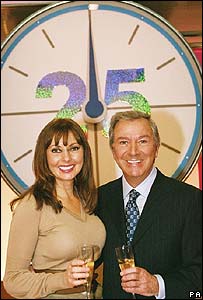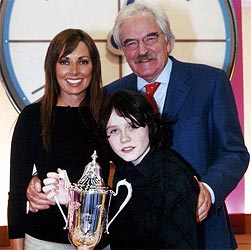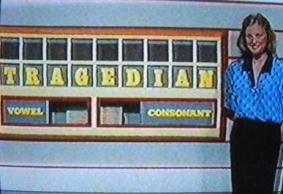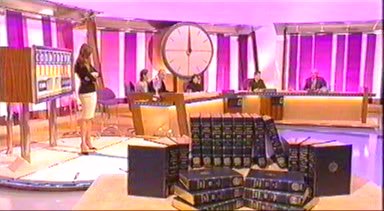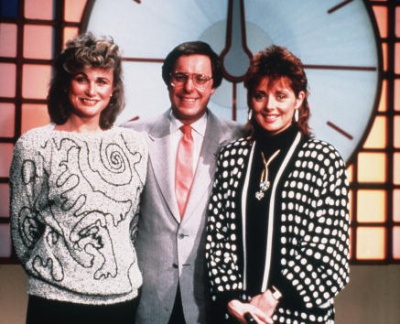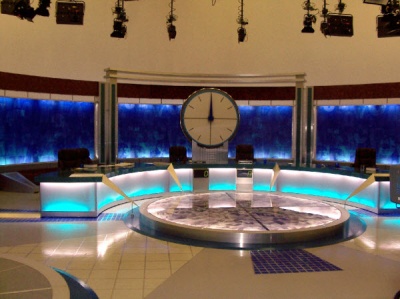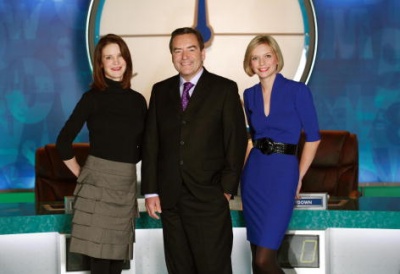Countdown
(→Game equipment: so what colours were the letter and number tiles in the first 17 series? Yellow on grey the first 10; white on blue thereafter. Also pointed out the years as appropriate) |
(→Champions: effing yes!! Sorry, I'm just so delighted that a 26-year wait for a female series champion is over... :)) |
||
| (18 intermediate revisions not shown) | |||
| Line 275: | Line 275: | ||
Speaking of the music, they introduced an "extra intensity" version of the 30-second vamp at the start of series 31 in January 1996. It lasted less than a month. | Speaking of the music, they introduced an "extra intensity" version of the 30-second vamp at the start of series 31 in January 1996. It lasted less than a month. | ||
| - | For the first ten series (up to the end of 1986), the | + | On ''Calendar Countdown'', the letter and number tiles were white on black. For the first ten Channel 4 series (up to the end of 1986), the tiles were yellow on grey, and for series 11 through 17 (early 1987 to early 1989), they were white on blue. In series 18 (summer 1989), they changed to red on white - all well and good, until someone pointed out that these are two excellent colours to trigger epileptic fits. The entire series having been recorded by then, an attempt was made to re-record every programme with the original contestants and Carol drawing the white-on-blue tiles that had been used in the previous seven series, but some of the contestants were no longer available (most notably series champion Rajaretnam Yogasagarar, aka Dr Yoga), meaning that the episodes in which these contestants participated had to be broadcast with the problematic red-on-white tiles! The white-on-blue scheme returned permanently at the start of series 19, at the beginning of 1990; a particularly thick font was used on the letter tiles during this series and the next, before the current font was introduced at the start of the fifth Championship of Champions, at the end of 1990. |
It's not always obvious to new viewers, but on the new set, the numbers board is on the back of the letters board. The whole boards area revolves and the stand with the numbers cards on it is brought on and placed in front. Also, the squared bit where Rachel writes the solutions is actually card, not a wipe-clean surface (too shiny, you see) so they have to take the old card off and put a new one on every time. | It's not always obvious to new viewers, but on the new set, the numbers board is on the back of the letters board. The whole boards area revolves and the stand with the numbers cards on it is brought on and placed in front. Also, the squared bit where Rachel writes the solutions is actually card, not a wipe-clean surface (too shiny, you see) so they have to take the old card off and put a new one on every time. | ||
| - | The | + | The episode of 15 March 2010 was a special invitation match between the then two most recent series champions, Kirk Bevins and Chris Davies. Because both were known to be extremely good at the numbers game, Rachel got to make the numbers selections instead of them, and the four regular "large" numbers were replaced with 12, 37, 62 and 87. As it turned out, only 12 and 37 were drawn, while one of the targets was a perfect multiple of 37 (296 = 8 x 37) that neither Bevins nor Davies spotted, but Rachel easily did. 12, 37, 62 and 87 were again the four "large" numbers in another special episode five months later, on 16 August 2010, between Charlie Reams and Junaid Mubeen (who had previously met in the series 59 grand final and in the thirteenth Championship of Champions); this time all four of them were drawn, with Rachel again making the selections instead of the contestants. |
=== Miscellaneous === | === Miscellaneous === | ||
| Line 293: | Line 293: | ||
The show was also amusingly mentioned in a 2002 revival of a single episode of the 1970's comedy series "Whatever Happened To The Likely Lads", starring Ant and Dec. The two lead characters, Bob and Terry, were trying desperately not to find out the result of a football match before watching it in the evening, when Bob had to stop his car outside a TV shop, where "Countdown" was being broadcast on the sets on display. Terry told him not to look at the screens, in case they came up with the announcement, "We interrupt this programme to go live to the football - and consonants to Richard Whiteley!" | The show was also amusingly mentioned in a 2002 revival of a single episode of the 1970's comedy series "Whatever Happened To The Likely Lads", starring Ant and Dec. The two lead characters, Bob and Terry, were trying desperately not to find out the result of a football match before watching it in the evening, when Bob had to stop his car outside a TV shop, where "Countdown" was being broadcast on the sets on display. Terry told him not to look at the screens, in case they came up with the announcement, "We interrupt this programme to go live to the football - and consonants to Richard Whiteley!" | ||
| - | An American version was piloted in 1990, presented by [[One Minute Please]] host Michael Jackson, but nothing came of it. You can read about it at [http://www.usgameshows.net/x.php?show=Countdown1990&sort=0 usgameshows.net]. | + | An American version was piloted in 1990, presented by [[One Minute Please]] host Michael Jackson, but nothing came of it. You can read about it at [http://www.usgameshows.net/x.php?show=Countdown1990&sort=0 usgameshows.net] and [[Weaver's Week 2023-10-29#Countdown|Weaver's Week]]. |
The show had been recorded at YTV's studios in Leeds but moved to Granada's Manchester base in May 2009. Up until then, the only time a Countdown game had been filmed away from Leeds was in 2001 when a backlog of productions at Kirkstall Road led to the last 28 nine-round episodes and the last 14-round episode being recorded at Tyne Tees in Newcastle. | The show had been recorded at YTV's studios in Leeds but moved to Granada's Manchester base in May 2009. Up until then, the only time a Countdown game had been filmed away from Leeds was in 2001 when a backlog of productions at Kirkstall Road led to the last 28 nine-round episodes and the last 14-round episode being recorded at Tyne Tees in Newcastle. | ||
| Line 319: | Line 319: | ||
'''Regular Series''' | '''Regular Series''' | ||
{| | {| | ||
| - | |'''1982''' ||''1''. Joyce Cansfield ||'''1992''' ||'' | + | |'''1982''' ||''1''. Joyce Cansfield ||'''1992''' ||''24''. Wayne Summers ||'''2002''' ||''47''. Chris Wills ||'''2013''' ||''69''. Callum Todd |
|- | |- | ||
| - | |'''1983''' ||''2''. Ash Haji || ||'' | + | |'''1983''' ||''2''. Ash Haji ||'''1993''' ||''25''. Don Reid || ||''48''. Julian Fell ||'''2014''' ||''70''. Mark Murray |
|- | |- | ||
| - | | ||''3''. Andrew Guy || | + | | ||''3''. Andrew Guy || ||''26''. Andy Bodle ||'''2003''' ||''49''. John Davies || ||''71''. Dan McColm |
|- | |- | ||
| - | |'''1984''' ||''4''. Brian Hudson || ||'' | + | |'''1984''' ||''4''. Brian Hudson ||'''1994''' ||''27''. [[David Elias]] || ||''50''. Chris Cummins ||'''2015''' ||''72''. Tom Cappleman |
|- | |- | ||
| - | | ||''5''. Peter Evans || | + | | ||''5''. Peter Evans || ||''28''. Damian Eadie ||'''2004''' ||''51''. Stewart Holden || ||''73''. Jonathan Wynn |
|- | |- | ||
| - | |'''1985''' ||''6''. Darryl Francis || ||'' | + | |'''1985''' ||''6''. Darryl Francis ||'''1995''' ||''29''. Darren Shacklady || ||''52''. Mark Tournoff || '''2016''' ||''74''. Paul Erdunast |
|- | |- | ||
| - | | ||''7''. Ian Bebbington || | + | | ||''7''. Ian Bebbington || ||''30''. Verity Joubert ||'''2005''' ||''53''. John Mayhew || ||''75''. Martin Hurst |
|- | |- | ||
| - | |'''1986''' ||''8''. Clive Spate || ||'' | + | |'''1986''' ||''8''. Clive Spate ||'''1996''' ||''31''. David Acton ||'''2006''' ||''54''. Conor Travers ||'''2017''' ||''76''. Stephen Read |
|- | |- | ||
| - | | ||''9''. David Trace || | + | | ||''9''. David Trace || ||''32''. Alan Sinclair || ||''55''. Richard Brittain || ||''77''. Tom Chafer-Cook |
|- | |- | ||
| - | | ||''10''. Harvey Freeman || ||'' | + | | ||''10''. Harvey Freeman || ||''33. Harvey Freeman'' ||'''2007''' ||''56''. Nick Wainwright ||'''2018''' ||''78''. Zarte Siempre |
|- | |- | ||
| - | |'''1987''' ||''11''. John Clarke || ||'' | + | |'''1987''' ||''11''. John Clarke ||'''1997''' ||''34''. Huw Morgan || ||''57''. Craig Beevers || ||''79''. Mike Daysley |
|- | |- | ||
| - | | ||''12''. Stephen Balment || | + | | ||''12''. Stephen Balment || ||''35''. Pete Cashmore ||'''2008''' ||''58''. David O'Donnell ||'''2019''' ||''80''. Dinos Sfyris |
|- | |- | ||
| - | | ||''13''. Hilary Hopper || ||'' | + | | ||''13''. Hilary Hopper || ||''36''. Tony Baylis || ||''59''. Junaid Mubeen || ||''81''. James Haughton |
|- | |- | ||
| - | | ||''14''. Nic Brown || ||'' | + | | ||''14''. Nic Brown || ||''37''. Ray McPhie ||'''2009''' ||''60''. Kirk Bevins ||'''2020''' ||''82''. Luke Johnson-Davies |
|- | |- | ||
| - | |'''1988''' ||''15''. Dick Green || ||'' | + | |'''1988''' ||''15''. Dick Green ||'''1998''' ||''38''. John Ashmore || ||''61''. Chris Davies ||'''2021''' ||''83''. Adam Latchford |
|- | |- | ||
| - | | ||''16''. Tony Vick || | + | | ||''16''. Tony Vick || ||''39''. Kate Ogilvie ||'''2010''' ||''62''. Oliver Garner || ||''84''. Ahmed Mohamed |
|- | |- | ||
| - | |'''1989''' ||''17''. Lawrence Pearse || ||'' | + | |'''1989''' ||''17''. Lawrence Pearse ||'''1999''' ||''40''. Terence English || ||''63''. Jack Hurst ||'''2022''' ||''85''. Dan Byrom |
|- | |- | ||
| - | | ||''18''. Rajaretnam Yogasagarar || | + | | ||''18''. Rajaretnam Yogasagarar || ||''41''. Scott Mearns ||'''2011''' ||''64''. Edward McCullagh || ||''86''. Tom Stevenson |
|- | |- | ||
| - | |'''1990''' ||''19''. Michael Wareham || ||'' | + | |'''1990''' ||''19''. Michael Wareham ||'''2000''' ||''42''. Michael Calder || ||''65''. Graeme Cole ||'''2023''' ||''87''. Ronan Higginson |
|- | |- | ||
| - | | ||''20''. Liz Barber || | + | | ||''20''. Liz Barber || ||''43''. Graham Nash ||'''2012''' ||''66''. Jack Worsley || ||''88''. Harry Savage |
|- | |- | ||
| - | |'''1991''' ||''21''. Barry Grossman || ||'' | + | |'''1991''' ||''21''. Barry Grossman ||'''2001''' ||''44''. Stuart Wood || ||''67''. Paul James ||'''2024''' ||''89''. Arthur Page |
|- | |- | ||
| - | | ||''22''. Chris Waddington ||''' | + | | ||''22''. Chris Waddington || ||''45''. John Rawnsley ||'''2013''' ||''68''. Giles Hutchings || ||''90''. Fiona Wood |
| + | |- | ||
| + | ||'''1992''' ||''23''. Gareth Williams || ||''46''. Ben Wilson | ||
|} | |} | ||
| Line 409: | Line 411: | ||
== Web links == | == Web links == | ||
| - | [http://www.channel4.com/programmes/countdown Channel 4 | + | [http://www.channel4.com/programmes/countdown Channel 4 programme page] |
[http://www.wedigtv.com/countdown/ Countdown Broadband game] from WeDigTV.com | [http://www.wedigtv.com/countdown/ Countdown Broadband game] from WeDigTV.com | ||
| Line 459: | Line 461: | ||
== How to apply == | == How to apply == | ||
| - | The | + | The [http://www.channel4.com/4viewers/take-part/countdown application form] is now on the Channel 4 website. Alternatively, you can get a form sent to you by e-mailing [mailto:countdown@channel4.com countdown@channel4.com] |
| - | + | ||
| - | Alternatively, you can get a form sent to you by | + | |
| - | + | ||
| - | + | ||
| - | + | ||
| - | + | ||
| - | + | ||
| - | + | ||
For audience tickets, call 0161 9520408 or email [mailto:shantelle.gaston-hird@itv.com shantelle.gaston-hird@itv.com]. | For audience tickets, call 0161 9520408 or email [mailto:shantelle.gaston-hird@itv.com shantelle.gaston-hird@itv.com]. | ||
Current revision as of 12:57, 23 December 2024
Contents |
Host
Richard Whiteley (1982-2005)
William G. Stewart (1997 Christmas special)
Des Lynam (2005-6)
Des O'Connor (2007-8)
Jeff Stelling (2009-11)
Nick Hewer (2012-21)
Colin Murray (stand-in, 2020-21, full time, 2022-)
Anne Robinson (2021-22)
Trevor McDonald (guest host, 2021, 2022)
Les Dennis (stand-in, 2022)
Jenny Eclair (stand-in, 2022)
Floella Benjamin (guest host, 2022)
Richard Coles (guest host, 2022)
Moira Stuart (guest host, 2022)
Co-hosts
Hostesses: Denise McFarland-Cruikshanks (Calendar Countdown), Robena Sharp (Calendar Countdown), Kathy Hytner (Calendar Countdown and Countdown series 1-13), Beverley Isherwood (series 1-3), Karen Loughlin (series 14-16), Lucy Summers (series 17), Carol Vorderman (series 18-59), Rachel Riley (series 60-), Anne-Marie Imafidon (series 84-85)
"Vital statisticians": Angela Garbut (Calendar Countdown), Dr Linda Barrett (series 1-2), Carol Vorderman (series 1-59), Rachel Riley (series 60-), Anne-Marie Imafidon (series 84-85)
Lexicologists: Susie Dent (current, first appeared in series 24 but permanent from series 49). Others with over 100 appearances include Catherine Clarke, Damian Eadie, Mark Nyman, Richard Samson, Julia Swannell, Della Thompson, Freda Thornton
Broadcast
as Calendar Countdown Yorkshire Television (regional), 19 April to 7 June 1982 (8 episodes in 1 series)
Yorkshire Television (Granada from 1 November 2004 to 8 May 2009, ITV Studios from 11 May 2009 to 20 April 2021, Lifted Entertainment (part of ITV Studios) from 21 April 2021 to present) for Channel 4, 2 November 1982 to present
(except 2 new episodes broadcast on More 4, 24 and 25 February 2021)
as Countdown Masters (insert in The Channel 4 Daily) 3 April 1989 to 29 March 1991 (97 games aired + 1 partially aired + 6 unaired)
as Celebrity Countdown (primetime) 23 April to 18 June 1998 (8 episodes in 1 series); More 4, 12 November 2019 to present
Synopsis
"I'll have a consonant, a vowel, another vowel, a consonant, another consonant. Another consonant, a vowel, a consonant and a final consonant please."
That might sound boring to you, but since Channel 4's launch this show, and for the length of their runs Fifteen-to-One and/or Deal or No Deal, propped up Channel 4's afternoon schedule and still draws in shedloads of pensioners, students and other people who make an appointment to watch it.
Countdown was based on a French show ("Des Chiffres et Des Lettres" - or "Numbers and Letters") and the format has proved popular throughout much of the world. It could be argued that the Brit version is the more lively interpretation of the format.
The first British incarnation of the show was a Yorkshire TV regional filler for eight weeks in the spring of 1982. Richard Whiteley hosted, and it's probably fair to say that the show did not immediately distinguish itself. Luckily, at around the same time, Channel 4 was looking for a game show for their launch line-up, and happened upon the French format Des chiffres et des lettres. Since Yorkshire was already making a British version, they pretty much just transferred the show to Channel 4. Whiteley stayed on, a number of young ladies were brought in to do all the odd jobs around the studio - mainly sticking magnetic tiles in a frame - and the rest is history.
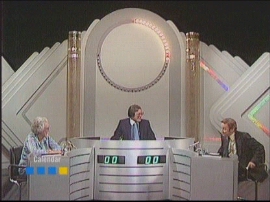 How the pilot looked (though obviously, it didn't have that modern bug in the corner). This snazzy minimalist clock was replaced with something more like the familiar clock face for the series proper.
How the pilot looked (though obviously, it didn't have that modern bug in the corner). This snazzy minimalist clock was replaced with something more like the familiar clock face for the series proper.The idea is as simple as can be: Two players duel in a battle of vocabulary knowledge and numerical agility.
Eleven (originally six) rounds are letters games, where the players try and make the longest word they can from nine pseudo-randomly selected letters. Each player takes turns at selecting the make-up of vowels and consonants in that nine. After thirty seconds of thinking time, to which we're treated to the famous Countdown think music, the players declare the words that they have. One point per letter is awarded to the contestant that has the longest word. In the case of ties, both players get the points.
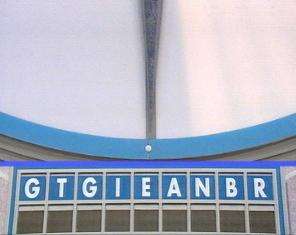 A letters game in progress - what's the longest word you can find? (answer below)
A letters game in progress - what's the longest word you can find? (answer below)After each game, we go across to another corner of the studio where a guest celebrity (whom Richard Whiteley used to refer to as the Guardian of the Dictionaries) plus an oh-so-handily placed lexicographer from the Oxford English Dictionary tells us about any longer words that they have found. (Such are the demands of rapid recording, the production team sometimes prime the celeb with words found manually via an earpiece - but contrary to what some people believe, they don't use electronic word-finders or any of that malarkey.)
Three (originally two) numbers games where players use their arithmetical skills in order to get to a target number using only the six numbers they've got and the four basic number operations. The numbers are chosen from a board which contains the numbers from 1 to 10 twice over, and one each of 25, 50, 75 and 100. Contestants can ask for any combination of small and large numbers, but they are drawn at random from within each group. Contestants often ask for certain patterns, such as one from the top and five from a given row, an "inverted T" (six tiles whose removal leaves that shape on the board), or a "Whitehall" (one from the top, two from the second row, one from the third and two from the fourth, referring to the old Metropolitan Police phone number, "Whitehall 1212"). An electronic computer called CECIL selects a target number from 100 to 999 inclusive at random. After thirty seconds, the solutions are checked. Ten points if you can get the number spot on, seven points if you're within five, and five points if you're within ten. Only the contestant that is closest to the target gets the points, though.
Finally, there's the conundrum, a nine-letter anagram on the buzzers for a final ten points. If this decides the game, as it often does, it is referred to as the "Crucial Countdown Conundrum".
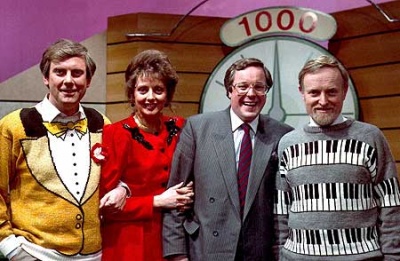 Carol and Richard with two of the regular GotD's - Gyles Brandreth and Richard Stilgoe
Carol and Richard with two of the regular GotD's - Gyles Brandreth and Richard StilgoeThe winner gets to return on the next show, up to eight programmes maximum (undefeated people being referred to these days as Octochamps). The eight top performers from the whole series go on to an end-of-series playoff, including a final.
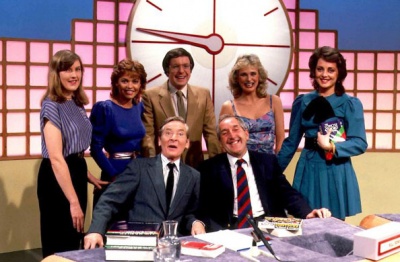 Barratt, Isherwood, Whiteley, Hytner and Vorderman, with dictionary corner guests Kenneth Williams and Ted Moult. Williams complained bitterly in his diary about having to hang around for a whole day just to pose for this photo.
Barratt, Isherwood, Whiteley, Hytner and Vorderman, with dictionary corner guests Kenneth Williams and Ted Moult. Williams complained bitterly in his diary about having to hang around for a whole day just to pose for this photo.The original hostesses were Kathy Hytner and Beverley Isherwood, who used to select the letters and numbers cards respectively. Either Linda Barrett or Carol Vorderman was wheeled on twice a show (they did alternate programmes) to check the calculations for the numbers game. Isherwood and Barrett were early casualties, but it wasn't until 1989 that all these jobs came under the purview of a single hostess when the third "letters girl" Lucy Summers left and Vorderman was put in charge of the lot.
For ten years, Carol Vorderman seemed painfully obscure and then she sort of exploded randomly onto every programme going. Richard Whiteley, on the other hand, was just strangely obscure from the start. Or was that just his ties? Or his godawful puns?
The final, and in a way the most crucial, member of the team is the resident lexicologist, who rules on the admissibility of words and (usually) suggests better ones, often pointing them out in the dictionary with the aid of a hand-held "pencam". Traditionally this post was filled by someone sent up from the OUP, often Catherine Clark, Della Thompson or Richard Sampson. In the 1990s, series producers (and former champs) Mark Nyman and Damian Eadie frequently turned up in Dictionary Corner instead, but nowadays the role is permanently filled by Susie Dent, who first appeared way back in 1992, but has only gone "full time" since 2003. Her catchphrase: "Fantastic!".
Inevitably with such a successful format, Champion of Champions and Celebrity versions have been made. There was also the short-lived Countdown Masters, a daily five-minute item on The Channel 4 Daily, where the same two contestants played a letters game, a numbers game and a conundrum each weekday for a week.
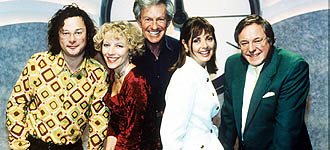
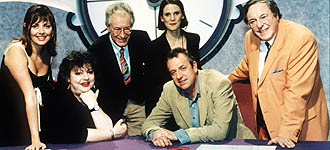 Celebs from two editions of Celebrity Countdown: (top) Hugh Fearnley-Whittingstall, Jilly Goolden, Patrick Lichfield with Carol and Richard; (bottom) Carol, Jo Brand, Bamber Gascoigne, Susie Dent (from the OED), Arthur Smith, Richard.
Celebs from two editions of Celebrity Countdown: (top) Hugh Fearnley-Whittingstall, Jilly Goolden, Patrick Lichfield with Carol and Richard; (bottom) Carol, Jo Brand, Bamber Gascoigne, Susie Dent (from the OED), Arthur Smith, Richard.It is perhaps comforting to know that a programme of this kind can still hold its head up in a world where people's attention span rarely lasts more than thirty seconds.
And the longest word you can find in that letters game above is REBATING or BERATING. Badda... badda... badda-daa-da.... boom!
Key moments
If someone discovers a nine-letter word in one of the normal letters games, they receive 18 points (i.e. double 9) for it. And the set flashes, which is nice.
One famous out-take came from a 1991 Champion Of Champions semi-final between Gino Corr and Lawrence Pearse, which contained an 'interesting' word claimed by both players (seven letters, begins with W). Of course, they could have had DARKENS or ASUNDER for seven points - but where's the fun in that?
Amazingly, the situation happened again - this time in the singular form. It was apparently broadcast for real in 2003, but rather heavily edited down with, we presume, the schoolboy sniggering from the audience cut out of the audio track. The word was also in evidence in 2008 during the Des O'Connor period, and poor Nick Hewer had barely got his seat warm when, in January 2012, a contestant scored 6 points for the same word when his rival's WEAKENER was disallowed for having too many E's.
Surely HERNIA would be better?
Another funny moment was when another contestant declared an 8 letter word beginning with E...
"Don't do this to me Kate!, I don't want to be on any more late night blooper shows!"
One classic moment from 1997 was the following numbers game, which was solved by a contestant called James Martin:
- Numbers selected: 100 75 50 25 6 3
- Target: 952
- James Martin: 100+6=106. 106x3=318.
- (Carol Vorderman writes this down as usual)
- JM: I'd now like to multiply by 75.
- CV: Multiply by 75?
- JM: Yes.
- CV: Multiply this (indicating the number 318) by 75?
- JM: Yes.
- CV: And then divide by something later on?
- JM: In a minute!
- (Carol and James then both try to work out the value of 318x75. Carol then writes down 23,850 on the board).
- JM: Subtract 50.
- (Carol is now laughing a lot by this point)
- JM: Divide by 25 to get 952.
- CV: (Stops laughing) I think ... you are right!
- (Much applause.)
It could have been worse - he could have just done (100+3) x 6 x 75 for a product of 46350, then divided by 50 and added 25.
How clever can you get?
From time to time, the contestants selection of vowels and consonants can lead to questionable (for daytime at least) words being spelt out. On one occasion, Carol bravely tried to carry on when the letters so far were TBOARSE, but had to stop when the next letter was a D. On another occasion, the letters picked spelled out POO, causing much hilarity. When the next letter chosen was F, the recording was stopped, and the round re-started. While that was left out of the final programme, the occasion when the letters spelled out FART was left in, at the insistence of Whiteley and Vorderman.
On 7 February 2007, the first four letters spelt out MILF but, presumably as the typical Countdowner isn't a fan of American Pie, it went out without comment. The Star newspaper claims Carol gave a "cheeky smile" after the fourth letter but, if she did, it was very hard to spot.
In an outtake, during the adjudication of a numbers game with a target of 700 with 7 and 100 in the selection, Nick Hewer commented: "Poor old Rachel, she's been gagging for a hard one".
Catchphrases
"There's nine in the frame, let's get on with the game."
"Please reveal today's Countdown Conundrum!"
"A consonant, please, Carol!"
"Let's go ferr'et" (a reference to an infamous out-take, much repeated on It'll Be Alright on the Night, where Richard Whiteley - in his more usual role as a news reader for Yorkshire TV - had his finger bitten by a ferret). Richard started saying this because he didn't have a catchphrase and so he thought he'd invent one of his own. It never really took off, though, mainly because he didn't actually say it very much, thus rather defeating the point of having a catchphrase at all.
Later he started saying "the best bits are at the beginning", which almost took off. But not quite.
Daily winners can play for up to 8 matches before they're booted off. Richard used to call these Octochamps, later Octavians.
Des O'Connor: "Hello Countdowners everywhere!".
Contestants (after a tricky consonant, usually Q or Z): "And a better one, please."
Catch-tune: Da da da da da-da-da-da BOOM!
Inventor
Based on the French show, Des Chiffres et Des Lettres (Digits and Letters), devised by Armond Jammot. The programme has been running on French television since 1972. We can't understand why, because it's slow and boring.
Theme music
Composed by Alan Hawkshaw, who - natch - also composed the think music. Apparently, he gets a royalty every time the clock is started. As of 2008, this has happened over 27,000 times.
Trivia
Broadcast info
Countdown was the first programme ever broadcast on Channel 4, and Richard Whiteley was the first face to be seen. Richard's first words at the start of the very first episode of Countdown were: "Hello, hello - good evening and as the countdown to a brand new channel ends, a brand new Countdown begins.'' The first voice on the new channel, however, was that of continuity announcer Paul Coia - little did any of us know that he would also host a slightly less-successful word game on weekday afternoons, Catchword on BBC2.
The very first letters game produced the selection of T, N, E, M, A, R, H, I, B. The contestants came up with two seven-letter words, RAIMENT and MINARET. The first daily winner, Michael Goldman, later sued the organisers of a Scrabble tournament for not allowing him sufficiently long to go to the toilet. He won £90 plus some costs.
Countdown was originally commissioned for just seven weeks. However, it has stood the test of time. It celebrated its 1000th edition on 2 July 1990, its 2000th edition on 23 May 1997, its 3000th edition on 27 April 2001, its 4000th edition on 3 January 2006, and its 5000th edition on 26 March 2010. Its 7500th edition, on 4 May 2021, preceded a short tribute to Marcel Stellman, who had died on 2 May, and whose name appears at the end of every episode in the credit "By arrangement with Marcel Stellman". (Why does the writer of "Tulips from Amsterdam" get his name on screen? Back in the 1970s, he bought up the rights to Des Chiffres et des Lettres for the world outside France, and controls the format that Yorkshire Television (and its successor companies) use.)
The listing in the TV Times for the very first episode at 4.45pm on 2nd November 1982 went as follows: "A great new quiz to launch Channel Four. Countdown combines entertainment and intellectual tease as it juggles letters, numbers, anagrams and sums. Contestants compete against the clock and against former Brain of Britain star, farmer Ted Moult and his team of statisticians and wordsmiths. It's light-hearted but educational as Ted tells us about the origins of certain words. And it's a game for the family at home - so have pens and paper ready. Presented by Richard Whiteley, Countdown will be on screen four nights a week from Monday to Thursday."
The following week's TV Times contained the following cryptic billing: Fi uoy anc orwk tou hits margana ouy rea lysuoivbo a ededvot afn fo Countdown. Otinght ehrte si orme ufn iwth gifures, eiswrcaksc dna ordsw. Dirty Wheelchair stsoh, hwit Dem O'Tult.
Until 1991, if a game ended in a tie, the two contestants would return the next day for a replay. Additional conundrums were only used in the series final. But after no less than four tied games in series 21, the format was changed so that additional conundrums were used in all games that ended level until there was a winner.
The series 53 grand final was the 3,959th episode of Countdown and Richard presented all but one of these episodes. The only other person to have hosted Countdown is William G. Stewart who fronted the 1997 Christmas special, a match between Richard and Carol. He also hosted a This Is Your Life-style retrospective which was broadcast immediately after the 1999th edition (though it's not considered a proper Countdown episode). For the show's (and Channel 4's) 25th birthday in 2007, there was a special match between two outstanding latterday players, Chris Wills and Conor Travers, with the letters and numbers being picked by celebs in filmed inserts.
Until 2001 the show was half an hour long with the grand finals 45 minutes long. All episodes are now 45 minutes long.
Countdown went six days a week in January 2006, making up a game show double-bill with Deal or No Deal from Monday to Saturday. Although Des and Carol made a big deal of this being the "first ever" time the show had been aired on a Saturday, this had actually happened a few times before (albeit not as a regular thing), the first time being the grand final of series 2 way back in July 1983. Three games in series 14 were broadcast on Saturdays in 1987 leading up to the first Christmas Day final (there were also Christmas Day finals four years running from 1998, and again in 2004), and another episode went out on Saturday in July 1989 because Channel 4 had something else on the Friday. In January 1985 one episode even went out on a Sunday, due to its regular Wednesday slot being usurped that week. (Thanks to Chris Wills for pointing this out.)
On 2 January 2012, as part of celebrations to mark Channel 4's 30th year of broadcasting, the channel aired an evening of special programmes, entitled the Channel 4 Mash-Up, which saw the presenters of different Channel 4 series take part in a 'job swap'. One such swap, entitled 8 Out of 10 Cats Does Countdown saw 8 Out of 10 Cats presenter Jimmy Carr take over Nick Hewer's hosting duties, in a episode pitting 8 Out of 10 Cats team captains Sean Lock and Jon Richardson against each other. This special proved popular, and the programme has since become a series in its own right.
Series 82 took a break in the middle as a consequence of the Covid-19 pandemic. Two episodes of series 83, broadcast 24 and 25 February 2021, premiered on More 4 due to Channel 4 buying the rights to cricket at short notice, with these two days having already been filmed. The episode due to be broadcast 26 February 2021 might also have been burned off there had cricket not ended early.
The episode broadcast on 10 September 2021 was a Black To Front special, with Trevor McDonald, Anne-Marie Imafidon and Lemn Sissay in place of Anne Robinson, Rachel Riley and Susie Dent.
Contestants
Contestants have ranged in years from 8 (Tanmay Dixit, James Squires) to 89 (Geoffrey Green). The youngest champion is 14-year-old Conor Travers, winner of series 54. Episodes from series 64 have not allowed those under 16 to take part.
Occasionally, people who were child contestants get accepted back for another go as adults. One such contestant was Junaid Mubeen, who lost on his first appearance as a 14-year-old in 1998, before becoming series champion ten years later.
Multiple winner Mark Nyman (see Champions below) produced the programme for many years, as well as appearing in Dictionary Corner and writing several of the Countdown puzzle books. He is also known as a veteran Scrabble champion.
Latterday producers Michael Wylie and Damian Eadie were also both former series finalists - Wylie was runner-up in series 1, Eadie was champion of series 28.
Series winner David Acton asked for the CD-ROM version of the dictionary as his prize, because he was a vegan and didn't approve of the leather-bound version.
Child genius Allan Saldhana was awarded a complete OED despite losing the series 15 final after it was discovered that lexicologist Catherine Clarke had made a mistake in disallowing the perfectly acceptable word "yolked".
In 2010, Burnley FC's Clarke Carlisle was the first Premiership footballer on the show, beating reigning champion Adam Guest by 89 points to 55. (Notts County's Neil Mackenzie was the first league player to appear.) Carlisle said "I can't say it's better than winning a big football game, but it's up there." He went on to win his second game 101 to 78, before being defeating narrowly 86 to 89 in his third game. As it happens, he was also the winner of Britain's Brainiest Footballer in 2002.
Notable words
The aforementioned Tanmay Dixit is famous, nay infamous, for offering FARTED and FANNIES during the first of his three appearances on the programme.
In 2001, Bruno Murray offered ORGASMED out of the selection ADIRGOMES, to which Carol, for once, lost it a bit: "Yes! Yes! It is allowed." Richard concluded, "That's the first orgasm we've had on this show in 18 years."
On 22 January 2008, one letters selection came out as SRETNACED. The remarkable thing about that selection is that it actually spells out a nine-letter word - just backwards. Neither player got it, but Carol spotted it because she sits on the right-hand side of the board and naturally looks along to the left from her vantage point.
The word COUNTDOWN has appeared as the Countdown Conundrum at least once: on 22 November 2001, when it was disguised as WONCDONUT. On a similar tip, the conundrum used on the 1000th programme was, appropriately enough, MILLENIUM. Unfortunately, the producers got this wrong - the correct spelling is MILLENNIUM. However, the contestant (child sensation Allan Saldanha) got the correct answer so he was given the 10 points.
In 2010, the selection DTCEIASHF had to be cut from the show when Cambridge University student Jack Hurst made the word SHITFACE which is, as Susie Dent confirmed to Jeff Stelling, a term for a "rude or obnoxious person". Call himself an Oxbridge student? He should have added the extra D to make SHITFACED, meaning "extremely drunk". Students these days... (However, Lesley Hines points out: "SHITFACED isn't in the ODE2r - it's hyphenated which is why he didn't declare it.")
Scoring records
Four contestants have scored zero - John Brooks in series 13, Sylvia Pitman in series 39, Sarah Herbert in series 85, and former The Apprentice candidate Avi Sharma in series 88. Herbert and Sharma's failures were that bit more abject on account of their scoring zero over fifteen rounds.
The highest-scoring Octochamp in the 15-round era is Elliott Mellor, who totalled 1061 points over his run in 2019.
Hostesses
Hostesses Beverley Isherwood and Karen Loughlin were both third-placed finalists in Miss United Kingdom - Isherwood in 1978, and Loughlin a year later. Isherwood also hostessed for Where in the World?.
When Karen Loughlin replaced Kathy Hytner as "the letters girl", a lot of press attention was focused on the fact that she had been an extra in the movie A View To A Kill: "Glamorous Bond Girl Joins Countdown", that sort of thing.
Game equipment
CECIL, the random number generator for the numbers games, stands for Countdown's Electronic Calculator in Leeds. The name was apparently chosen in honour of Cecil Korer, Channel 4's first head of light entertainment, who commissioned the show. On the earlier Calendar Countdown, the numbers were generated by a mechanical device with spinning drums called, for some reason, Harry. Harry's "hundreds" drum had a zero on it, so potentially anything from zero to 999 could have turned up. CECIL only generates numbers from 101 up.
One of the most common questions about the show is whether the clock goes all the way round. And the answer is: yes, it does. The hand moves clockwise all the way round back to the top. In the early days it took 30 seconds to do this, but nowadays it whizzes round in four or five seconds. When they originally designed it for Calendar Countdown, the clock clearly had bulbs up to to 45 seconds even though only 30 were used, because no one was sure how long the rounds should last when the set was built. On the earliest version of the main clock, which curiously had no markings on it, you could see that the clock also had lights up to 45 seconds. There are bulbs in the left-hand side but they're not connected up, they're just spares. When Noel Edmonds did his "Gotcha" on Richard Whiteley, in one round the music had been specially re-edited to go on for 40 seconds, but the clock still stopped at 30.
Speaking of the music, they introduced an "extra intensity" version of the 30-second vamp at the start of series 31 in January 1996. It lasted less than a month.
On Calendar Countdown, the letter and number tiles were white on black. For the first ten Channel 4 series (up to the end of 1986), the tiles were yellow on grey, and for series 11 through 17 (early 1987 to early 1989), they were white on blue. In series 18 (summer 1989), they changed to red on white - all well and good, until someone pointed out that these are two excellent colours to trigger epileptic fits. The entire series having been recorded by then, an attempt was made to re-record every programme with the original contestants and Carol drawing the white-on-blue tiles that had been used in the previous seven series, but some of the contestants were no longer available (most notably series champion Rajaretnam Yogasagarar, aka Dr Yoga), meaning that the episodes in which these contestants participated had to be broadcast with the problematic red-on-white tiles! The white-on-blue scheme returned permanently at the start of series 19, at the beginning of 1990; a particularly thick font was used on the letter tiles during this series and the next, before the current font was introduced at the start of the fifth Championship of Champions, at the end of 1990.
It's not always obvious to new viewers, but on the new set, the numbers board is on the back of the letters board. The whole boards area revolves and the stand with the numbers cards on it is brought on and placed in front. Also, the squared bit where Rachel writes the solutions is actually card, not a wipe-clean surface (too shiny, you see) so they have to take the old card off and put a new one on every time.
The episode of 15 March 2010 was a special invitation match between the then two most recent series champions, Kirk Bevins and Chris Davies. Because both were known to be extremely good at the numbers game, Rachel got to make the numbers selections instead of them, and the four regular "large" numbers were replaced with 12, 37, 62 and 87. As it turned out, only 12 and 37 were drawn, while one of the targets was a perfect multiple of 37 (296 = 8 x 37) that neither Bevins nor Davies spotted, but Rachel easily did. 12, 37, 62 and 87 were again the four "large" numbers in another special episode five months later, on 16 August 2010, between Charlie Reams and Junaid Mubeen (who had previously met in the series 59 grand final and in the thirteenth Championship of Champions); this time all four of them were drawn, with Rachel again making the selections instead of the contestants.
Miscellaneous
One of the regulars on French original Des Chiffres et Des Lettres is Bertrand Renard, who appeared in the audience for the 500th edition of Countdown in 1987 - and solved a numbers game that Carol couldn't!
The show could have turned out very differently, as it was originally Southern TV who grabbed the UK rights to the format. Had Southern not then gone and lost their ITV franchise, allowing Yorkshire to pick up the rights for a song, it might have been Countdown with Fred Dinenage.
An unsuccessful Junior Countdown pilot was recorded on 26 November 1982, with Gyles Brandreth hosting and Ted Moult in Dictionary Corner.
The show is probably best known in America for the appearance of a few clips in the 2002 Hugh Grant movie About a Boy. The clips come from a real episode, which was originally broadcast on 30 March 2001.
The show was also amusingly mentioned in a 2002 revival of a single episode of the 1970's comedy series "Whatever Happened To The Likely Lads", starring Ant and Dec. The two lead characters, Bob and Terry, were trying desperately not to find out the result of a football match before watching it in the evening, when Bob had to stop his car outside a TV shop, where "Countdown" was being broadcast on the sets on display. Terry told him not to look at the screens, in case they came up with the announcement, "We interrupt this programme to go live to the football - and consonants to Richard Whiteley!"
An American version was piloted in 1990, presented by One Minute Please host Michael Jackson, but nothing came of it. You can read about it at usgameshows.net and Weaver's Week.
The show had been recorded at YTV's studios in Leeds but moved to Granada's Manchester base in May 2009. Up until then, the only time a Countdown game had been filmed away from Leeds was in 2001 when a backlog of productions at Kirkstall Road led to the last 28 nine-round episodes and the last 14-round episode being recorded at Tyne Tees in Newcastle.
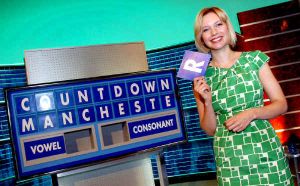 Rachel Riley, probably wishing the show had moved to Liverpool instead. Or Edinburgh. Or Maidstone. Or Guildford. Or Llandudno. Or...
Rachel Riley, probably wishing the show had moved to Liverpool instead. Or Edinburgh. Or Maidstone. Or Guildford. Or Llandudno. Or...Sick bags are provided because audience members often fall ill. On the positive side, they are given little Countdown pads so that they can play along. The front two rows change seats between recordings - and sometimes asked to change their cardigans - so that they don't appear too familiar on the next show.
In May 2007, Susie Dent missed three shows through illness, and producer Michael Wylie stood in. Because the same person isn't supposed to be listed twice in the end credits, the Dictionary Corner credit was listed as "Susie Gent". When she went on maternity leave for three months off between early November and early February Alison Heard stood in, and when she intermittently self-isolated due to COVID-19 from July 2021 to December 2022 the guardians of the dictionaries covered both roles and bizarrely so - the producer, Damian Eadie, had made 230 appearances as lexicographer, and could easily have stepped in. (Had he done it, he would have overtaken Catherine Clarke as the second most frequent Susiedent.)
Susie once said that her most embarrassing moment on the programme was when she highlighted the word "fucoid" on the pencam, forgetting that the word immediately above it on the page would also be visible...
When Richard Whiteley went into hospital with pneumonia in 2005, there were plans to continue Countdown over the summer with a series of guest presenters, rather like Have I Got News for You. Richard Digance, Lesley Garrett, Esther Rantzen, Barry Norman, Tim Rice, Nicholas Owen and Jennie Bond were all lined up to do five shows each. Richard died the day before filming was due to begin, and so the recordings were abandoned as a mark of respect. A series would not be hosted by eight people until the second half of 2022, when Anne Robinson left 18 episodes in, Colin Murray caught COVID 15 episodes later and Les Dennis and Jenny Eclair covered for eight and four episodes, and Floella Benjamin, Richard Coles, Trevor McDonald and Moira Stuart hosted a week each for Countdown's 40th birthday.
The very last conundrum on Richard's last programme before his sad departure, the series 53 grand final, was - ironically - LIFEFAIDS (answer: FALSIFIED). It was one of the very rare games in which a second conundrum had to be used to break a tie. In the series 59 grand final, which was Carol Vorderman's last show (as well as Des O'Connor's), the conundrum was ERACLOSES (answer: CASSEROLE). For Jeff Stelling's last show, the series 65 grand final, the first conundrum was TIMEUPLAD (answer: AMPLITUDE), and for Nick Hewer's swansong, the series 83 grand final, the conundrum was WASNOMORE (answer: OARSWOMEN). The series 60 grand final also had an apposite conundrum, ROVINGERA (answer: GRANIVORE), referring to the fact that this was the final episode recorded at the YTV studios. And props to the genius who set the mid-break teaser on the first programme in 2009 - Rachel Riley's debut as well as those of Jeff and the first blue set - and spotted that NURACHEL was an anagram of RELAUNCH.
From series 54 onwards, contestants are awarded the Richard Whiteley Memorial trophy, as well as leather-bound Oxford English Dictionary.
Rachel Riley announced her pregnancy by posing next to the Countdown Conundrum of RTINYMATE (which cleverly has a real answer: MATERNITY); recordings were paused for three and a half months while she went on maternity leave. They might have got away with it, had the COVID-19 pandemic not caused a four-month pause in recordings, resulting in the show going into repeats for the first time ever between 4 May and 7 August 2020. She announced her second pregnancy with the Countdown Conundrum FITTRILEY, with the answer FERTILITY; Anne-Marie Imafidon, who had fulfilled Rachel's role for the Black Takeover Day edition, covered for 60 further episodes.
Champions
Regular Series
| 1982 | 1. Joyce Cansfield | 1992 | 24. Wayne Summers | 2002 | 47. Chris Wills | 2013 | 69. Callum Todd |
| 1983 | 2. Ash Haji | 1993 | 25. Don Reid | 48. Julian Fell | 2014 | 70. Mark Murray | |
| 3. Andrew Guy | 26. Andy Bodle | 2003 | 49. John Davies | 71. Dan McColm | |||
| 1984 | 4. Brian Hudson | 1994 | 27. David Elias | 50. Chris Cummins | 2015 | 72. Tom Cappleman | |
| 5. Peter Evans | 28. Damian Eadie | 2004 | 51. Stewart Holden | 73. Jonathan Wynn | |||
| 1985 | 6. Darryl Francis | 1995 | 29. Darren Shacklady | 52. Mark Tournoff | 2016 | 74. Paul Erdunast | |
| 7. Ian Bebbington | 30. Verity Joubert | 2005 | 53. John Mayhew | 75. Martin Hurst | |||
| 1986 | 8. Clive Spate | 1996 | 31. David Acton | 2006 | 54. Conor Travers | 2017 | 76. Stephen Read |
| 9. David Trace | 32. Alan Sinclair | 55. Richard Brittain | 77. Tom Chafer-Cook | ||||
| 10. Harvey Freeman | 33. Harvey Freeman | 2007 | 56. Nick Wainwright | 2018 | 78. Zarte Siempre | ||
| 1987 | 11. John Clarke | 1997 | 34. Huw Morgan | 57. Craig Beevers | 79. Mike Daysley | ||
| 12. Stephen Balment | 35. Pete Cashmore | 2008 | 58. David O'Donnell | 2019 | 80. Dinos Sfyris | ||
| 13. Hilary Hopper | 36. Tony Baylis | 59. Junaid Mubeen | 81. James Haughton | ||||
| 14. Nic Brown | 37. Ray McPhie | 2009 | 60. Kirk Bevins | 2020 | 82. Luke Johnson-Davies | ||
| 1988 | 15. Dick Green | 1998 | 38. John Ashmore | 61. Chris Davies | 2021 | 83. Adam Latchford | |
| 16. Tony Vick | 39. Kate Ogilvie | 2010 | 62. Oliver Garner | 84. Ahmed Mohamed | |||
| 1989 | 17. Lawrence Pearse | 1999 | 40. Terence English | 63. Jack Hurst | 2022 | 85. Dan Byrom | |
| 18. Rajaretnam Yogasagarar | 41. Scott Mearns | 2011 | 64. Edward McCullagh | 86. Tom Stevenson | |||
| 1990 | 19. Michael Wareham | 2000 | 42. Michael Calder | 65. Graeme Cole | 2023 | 87. Ronan Higginson | |
| 20. Liz Barber | 43. Graham Nash | 2012 | 66. Jack Worsley | 88. Harry Savage | |||
| 1991 | 21. Barry Grossman | 2001 | 44. Stuart Wood | 67. Paul James | 2024 | 89. Arthur Page | |
| 22. Chris Waddington | 45. John Rawnsley | 2013 | 68. Giles Hutchings | 90. Fiona Wood | |||
| 1992 | 23. Gareth Williams | 46. Ben Wilson |
Series 33 was a Supreme Championship.
30th Birthday Championship
2013 Conor Travers
Champion of Champions
1-4: Mark Nyman (runner-up, series 3)
5-8: Clive Freedman (semi-finalist, series 7)
9-12: Harvey Freeman (champion, series 10)
13-16: Nic Brown (champion, series 14)
17-20: Tim Morrissey (semi-finalist, series 17)
21-24: Wayne Summers (champion, series 24)
25-28: Don Reid (champion, series 25)
29-32: Chris Rogers (runner-up, series 29)
34-37: Natascha Kearsey (runner-up, series 35)
38-41: Scott Mearns (champion, series 41)
42-48: Graham Nash (champion, series 43)
49-54: Paul Gallen (runner-up, series 52)
55-59: Steven Briers (quarter-finalist, series 55)
67-72: Dylan Taylor (runner-up, series 69)
73-78: Zarte Siempre (champion, series 78)
79-86: Ahmed Mohamed (champion, series 84)
There were no Champion of Champions series between 2009 and 2016; champions from series 60-66 were invited to the 30th Birthday Championship.
Champion of Champion of Champions
Mark Nyman won this title in a special match against Clive Freedman to open series 10. He also later beat the third C-of-C, Harvey Freeman, in a match in the Countdown Masters series.
Merchandise
Official Countdown Dictionary Listing of all allowable Countdown words
Countdown Puzzle Book
also Countdown Puzzle Book 2
Countdown Puzzle Mountain Puzzle book
Countdown: Spreading The Word by Michael Wylie and Damain Eadie (book)
Web links
Countdown Broadband game from WeDigTV.com
Mike's Countdown page - eclectic fan site
Off the Telly's interview with producer Damian Eadie
Andy Walmsley's set design pictures
Apply for audience tickets from Standing Room Only
Pictures
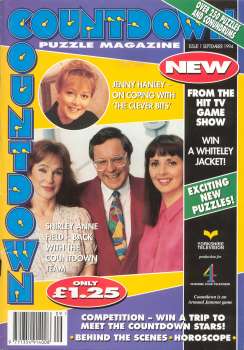 Issue 1 of the Countdown puzzle magazine
Issue 1 of the Countdown puzzle magazineVideos
Here's something you've never seen before, the unbroadcast 1981 pilot of Calendar Countdown
Warm-up man Greg Scott doing his special edition of the show
Some early morning rehearsals from 1997
Some behind the scenes footage with warm-up man Greg Scott from 1997 before an actual filming of an episode starts
How to apply
The application form is now on the Channel 4 website. Alternatively, you can get a form sent to you by e-mailing countdown@channel4.com
For audience tickets, call 0161 9520408 or email shantelle.gaston-hird@itv.com.
Application details are provided as a service to readers, but please note that all contestant enquiries should be directed to the named production company and not to UKGameshows.com. Addresses can be found on our list of contact details for production companies.
See also
8 Out of 10 Cats Does Countdown

